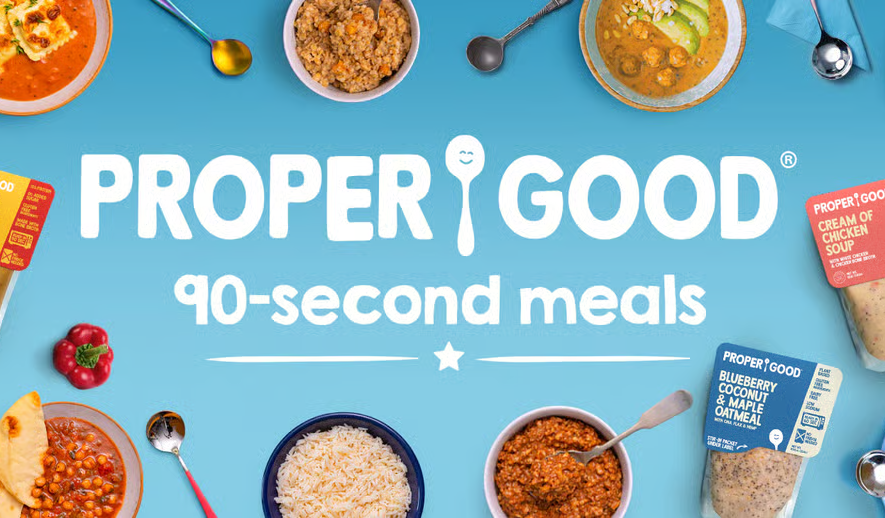Proper Good – Meet Our Client – Growth Study
The article was written by Patrycja Kościołowska in cooperation with Sublime and originally published by enjoyGrowth!
Proper Good is a D2C e-commerce company that offers ready-made, healthy meals. The company is currently available only in the US and operates in a subscription model.
The idea for Proper Good
Chris and Jen, siblings, created a business based on their need to eat healthy meals with very limited time during the day. As they point out, intense work usually means that we order healthy food to go, which is often expensive, or we end up eating food that is not necessarily good for our health, which was not acceptable for them.
In 2020, they decided to start Proper Good – a company that offers ready-made meals that can be prepared in 90 seconds or less. The dishes contain real and quality ingredients (the full composition and calorie content can be checked on the website) and can be stored outside the refrigerator. Available are oatmeal (introduced later in 2021, for example, overnight oatmeal with chocolate, banana, peanut butter and an additional portion of protein, or coconut with berries) and soups (for example, spicy pumpkin, tomato with basil, or mushroom with chicken). Meals are available in a variety of options, including keto, vegan, and gluten-free.
When we launched in 2020 covid restrictions were high so we could not do any in-person sampling, live events, trade shows, etc, so we launched from zero via Facebook/Instagram Ads primarily, this allowed us to heavily test different positionings for CTR rates – such as a focus on health, convenience, diets, etc, which guided early insights into what consumers value about our offerings and influenced further content creation and general brand positioning.
Chris Jane, Founder & CEO of Proper Good
In 2021, the founders took part in the popular Shark Tank program, which certainly brought them a lot of benefits related to brand awareness. They also placed quotes from businessmen on their website.

Finally, siblings accepted an offer: 400k $ for 20% of shares.
The company has gained momentum since last year. At the end of 2022, they partnered with Walmart, which placed their products in over 2,000 stores, significantly expanding product distribution beyond e-commerce. One interesting fact: about 90% of the US population lives within a radius of about 10 miles of this store.
At the same time, YETI Capital invested in Proper Good, whose managing director Maxx Karr commented on the transaction as follows:
Proper Good has created something truly innovative: ready-to-eat, healthy meals that taste incredibly great and are unbelievably convenient to eat.
Maxx Karr, YETI Capital
He also added a very valuable piece of information:
We are excited to invest in Proper Good, not only because Chris and Jennifer have created a new category of premium shelf-stable meals, but they’ve custom built a proprietary data platform (annotation: Sublime) with continuous feedback, ensuring consumers’ ever-changing demands are met.
Maxx Karr, YETI Capital
Business model
Products are priced between $3.99 and $6.99, with oatmeal being the cheapest option. A minimum of 6 products must be ordered through e-commerce, for a minimum basket of $40, which includes free shipping. Proper Good offers two methods of ordering on its website:
- Subscription model, which provides a $20 discount on orders
- One-time purchases, also known as one time purchase
Focusing on a subscription model has been a significant change for us. Consumers can buy individual best-selling items in the retail environment, but through our e-commerce store, they can subscribe to unlock discounts, special flavors, additional gifts, etc. Gamifying this and making it worthwhile for the consumer has increased short-term LTV significantly compared to non-subscription customers.
Chris Jane, Founder & CEO of Proper Good
Proper Good calls itself a D2C first company, but the products are also available in brick-and-mortar stores in limited quantities (about 10 products in Walmart, about 30 products in e-commerce).
The founders shared the level of margin they have on their products in the aforementioned Shark Tank appearance. That time a box of 12 meals costs about $72, and the cost of production is about $30. At the time, the company was not yet profitable because their CAC (customer acquisition cost) was 32 (note that this was 2021)
Selected tactics to improve Customer Experience.
As soon as you enter the website, there are 3 icons that immediately indicate the product’s features:

In the next part of the website, the concept of “zero-prep meals that even home cooks love…” is explained in a very simple way:
- Stress-free shopping → favorite products are delivered right to door, which in turn reduces the potential stress of shopping.
- Happy Spoon Guarantee, which is a refund if you are not satisfied with the products.

On the top of the page, there is also a benefit indicated for the subscription model: a 20% discount.

But that’s not all, because if you start to delve into the subscription, it turns out that there are a few more benefits associated with it:

Reviews are very well-functioning, and in the case of Proper Good, the average rating is 4.8 / 5 from 15,000, which is an amazing result at such a scale.

Case study of using data-driven to optimize the business.
Challenge: Proper Good was struggling to convert one-time customers into paying subscribers. They were wondering what they could offer as part of the subscription, because so far they had only relied on discounts.
Proper Goods’ e-commerce analytics has been built on the Sublime analytics platform from the beginning, which combines media data, web tracking from Google Analytics, and sales data from the sales platform. This made it possible to segment customers in any way (for example, into one-time and subscription customers) and study their profitability (Customer Lifetime Value and Customer Acquisition Cost). In the case of subscription models, customers have a 5-6 times higher return rate than in the case of one-time purchases, and this is confirmed by Sublime’s internal data:

In the case of Proper Good, they decided to take the next step, which was a more in-depth analysis that allowed them to compare LTV:CAC for one-time purchases and subscriptions.

Data showed that subscribers are 50% more valuable than non-subscribers. In the case of CAC, the cost of acquiring a customer, there is no such difference.
By understanding your LTV and CAC for subscribers and one-time customers, you can calculate the level of a permanent discount on subscriptions that is very attractive, and at the same time, you will earn more because of the much higher LTV.
The conclusion in this specific case: The LTV of subscription customers is 50% higher, CAC is only slightly higher, so it was safe to offer a 20% discount on everything, because 30% of the higher LTV will still remain. Based on this reasoning, Proper Good has had a permanent 20% discount since then, and at the beginning, it also gave a one-time $10 gift to encourage customers to buy subscriptions.
The result of the implemented changes is impressive, given the margin level on these products: a growth of +7% gross margin in a 12-month period.
Without a doubt the biggest challenge is cost effective customer acquisition. As we’re a food brand where AOVs tend to be in the $40 – $60 range, becoming ‘1st order profitable after CAC’ is incredibly difficult to scale in today’s digital marketing environment. So the question is continually how do we scale awareness and trial without traditional paid-digital-advertising.
Chris Jane, Founder & CEO of Proper Good
Additional acquisition tactics
On the Proper Good website, there is a classic option to sign up for the newsletter, where you can get a 10% discount. But a pop-up also appears on the page that contains a wheel of fortune. After entering the data, the lottery machine starts. This is an interesting mechanism that immediately engages the user and delivers dopamine in express speed through a sense of winning, which definitely triggers to purchase.


Another way to acquire and collect data (and engage customers) is a promotion: buy one meal, get one free → provide your number, buy two products at Walmart, and we will refund you for one of them. Through a simple solution, they acquire an additional communication channel with customers. Then, they can use it to conduct personalized communication that triggers purchases.

They collaborate with Brandambassador App, a mobile app that connects brands and consumers. Through the app, users can collect points and earn rewards:

At the same time, they also run their own loyalty program, where users can collect points, for example, for purchases and for social media activity:


Proper Good also operates charitably and in this aspect they collaborate with the Wellfare Foundation, where, as they indicate on their website:
The reality is that millions of Americans face barriers to accessing healthy food everyday but Wellfare is on a mission to fight against food insecurity with a free grocery service for qualifying low-income households.
They donate meals according to the following principle: for every social media post they share (which certainly translates into their reach among new users) and for every subscription order (which in turn engages their customers and gives them the feeling that they are doing something good for the world, and in general people like to help ) → in total they have already donated 10,000 meals.

Proper Good is an interesting example of a startup that was founded in the COVID year, when most e-commerce businesses saw significant growth and then declines → they did not stop, but they reached for external financing, increased their product range and entered a new distribution channel.
The growth study above also confirms that this is a business that is run very consciously and based on data-driven. They not only want to grow, but they attach great importance to data, on the basis of which they optimize their business to grow.
Subscribers proved to be 50% more valuable than one-time buyers. Book your demo now and learn how to uncover insights like these for your own business.
Contents
Contents




